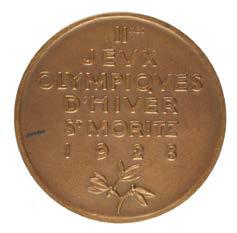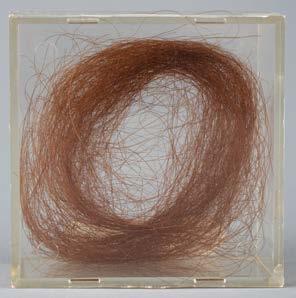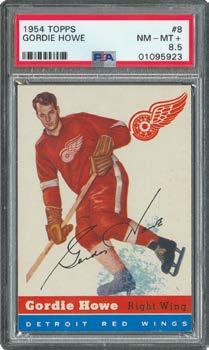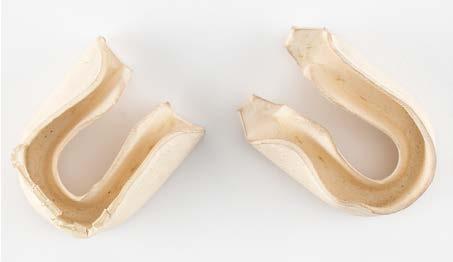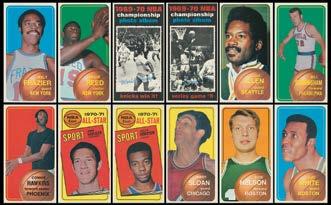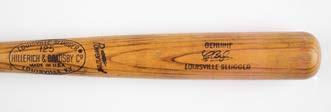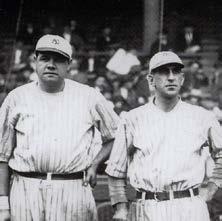
15 minute read
The Roger Peckinpaugh Collection

Ruth and Peckinpaugh with the Yankees in 1921
Peckinpaugh in the New York’s dugout in 1918
A natural leader and one of the top defensive players of his day, Roger Peckinpaugh is often cited as one of the best players to not be enshrined in Cooperstown. Though chiefly remembered for his strong throwing arm and rangy play in the middle of the infield, he was also capable at the plate, collecting 1,876 career hits. Traded from Cleveland to the New York Yankees in 1913, he quickly established himself as a leader in the clubhouse and was named captain by manager Frank Chance the next year. In 1914—at the age of 23—he became the youngest manager in the history of baseball, helming the Bronx Bombers for the last three weeks of the season after Chance's resignation. He served as a mentor to budding superstar Babe Ruth in 1920 and 1921, before being shipped off to Washington by way of Boston.
Reporting on the trade to baseball historian Marty Appel in 1974, Peckinpaugh recalled: "Babe Ruth hated [Miller] Huggins and wanted me to manage. Once we were leaving Boston after a tough loss, and Babe was drunk, and he said he was gonna throw Huggins off the train!...I got traded soon after to get me out of the picture." Starting for the Senators, Peckinpaugh earned his greatest accolades: World Series champion in 1924, and Most Valuable Player of the American League in 1925. Leg injuries plagued him in later years, and he retired from the field in 1927 to embark on a new chapter as a manager and later a baseball executive.


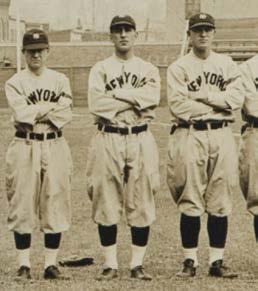
Roger Peckinpaugh’s rare game-used 1918 New York Yankees road uniform with WWI memorial armband
9001. Roger Peckinpaugh’s Game-Used 1918 New York Yankees Road Uniform. Roger Peckinpaugh’s game-
used New York Yankees road uniform from the 1918 season, including his jersey and pants. The button-down gray flannel jersey features “New York” (restored) across the chest and features a red, white, and blue silk World War I memorial armband on the left sleeve. It retains the proper Spalding manufacturer’s tag in the collar, and has the player’s surname chain-stitched to the right in light brown thread, “Peckingpaugh” [sic]. It has custom-hemmed sleeves, vented by underarm eyelets, and seven four-hole charcoal buttons down the front. The matching gray flannel pants feature a button-down fly and have the Spalding tag in the waistband, with “Peckingpaugh” chain-stitched below. Also includes two pairs of Peckinpaugh’s navy blue stirrups. In fine condition, with significant evidence of use including general wear and light staining, some fraying to the white portion of the tricolor armband, and some fraying to bottoms of the pant legs. Accompanied by a letter of opinion from MEARS Authentication, evaluating the jersey as “A7.5” with respect to characteristics and game use.
Any authentic, game-used uniform from the deadball era is virtually unheard of—that this comes from one of baseball’s early stars, and arguably its most legendary franchise, makes this example truly remarkable. Known for his steady defense and stable demeanor, Peckinpaugh served as the Yankees’ captain from 1914 to 1921. The special red, white, and blue armband allows us to date it precisely to 1918, a year in which Peckinpaugh turned more double plays than any other American League shortstop and also led the league in assists. A unique and exceptionally desirable early New York Yankees uniform, worn on the road by their capable captain.
Provenance: The Roger Peckinpaugh Family. Starting Bid $900
The “American League” uniform of Roger Peckinpaugh, a one-time AL MVP
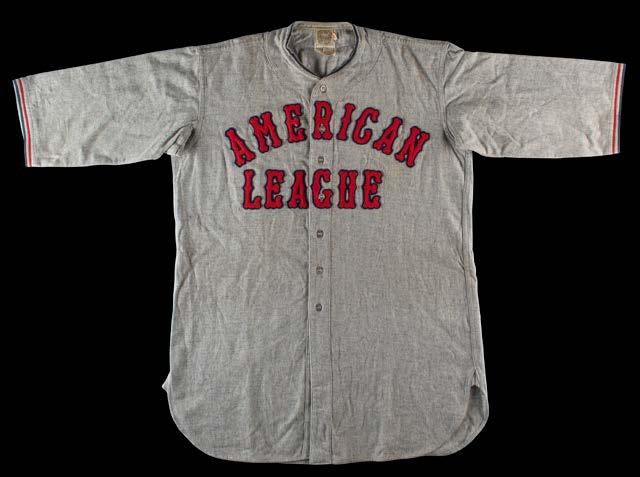
9002. Roger Peckinpaugh’s Personally-Worn 1920s-30s American League Exhibition Jersey. Roger Peck-
inpaugh’s personally-owned and -worn American League exhibition uniform from the 1920s-1930s, including his jersey and pants. The button-down gray flannel jersey features “American League” across the chest in red-on-navy felt lettering, matching piping on the sleeves, and navy blue piping on the collar. It retains the Spalding manufacturer’s tag in the collar, with size 42 flag tag, and typed tag identifying the player and size: “Roger Peckinpaugh, 0-101, C-42.” The gray flannel pants feature matching navy trim, a button-down fly, and Spalding tag in the waistband, with size 36 flag tag. Also includes a pair of Peckinpaugh’s black stirrups with red stripes. In fine condition, with significant evidence of use including general wear and light staining. Accompanied by a letter of opinion from MEARS Authentication, evaluating the jersey as “authentic” with respect to characteristics and game use, and noting: “’American League’ lettering on front is not original to jersey with the outline of previously applied lettering still visible. Jersey may have been repurposed from one of Peckinpaugh’s late 1920’s/early 1930’s jerseys, though MEARS cannot conclusively identify the original issuance.”
Peckinpaugh spent his entire 17-year playing career in the American League, spending nine seasons with the New York Yankees and five with the Washington Senators, along with stints in Cleveland and Chicago. As a veteran leader of the Washington squad, he won the 1924 World Series and was named American League Most Valuable Player in 1925. After retiring, he managed the Cleveland Indians from 1928 to 1933 and spent a season managing the Class-AA Kansas City Blues in 1934. In 1935, he joined former ballplayer Lew Fonseca on a series of nationwide baseball promo tours. Dubbed the ‘super salesman of the American League,’ Fonseca’s program included film showings, coaching clinics, and on-field demonstrations. As the personal “American League” uniform of one of the AL’s early MVPs, this is a unique and fantastic piece.
Provenance: The Roger Peckinpaugh Family. Starting Bid $500
Babe Ruth paid by Peckinpaugh—a rare 1921 check from one Yankee star to another
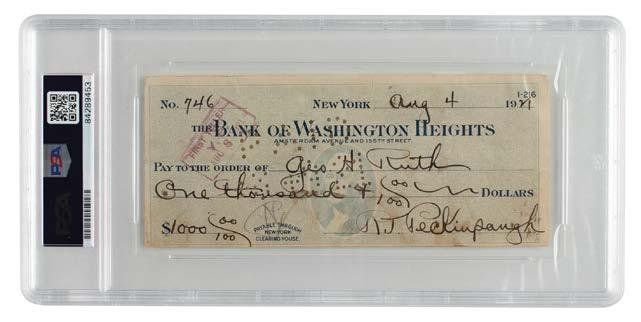
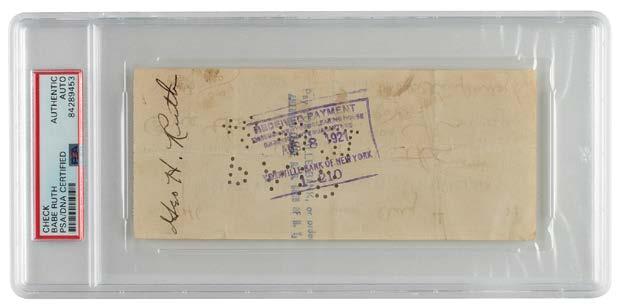
9003. Babe Ruth and Roger Peckinpaugh Signed Check. Bank of Washington Heights counter check, 6.25 x 2.75, filled out and signed by Roger Peckinpaugh, “R. T. Peckinpaugh,” payable to Geo. H. Ruth for $1000, August 4, 1921, endorsed on the reverse by Babe Ruth, “Geo. H. Ruth.” In fine condition. Encapsulated in a PSA/DNA authentication holder.
Babe Ruth and Roger Peckinpaugh were teammates on the New York Yankees in 1920 and 1921, just as Ruth emerged as baseball’s premiere home run hitter. On the day Peckinpaugh wrote this check, the Yankees squared off against Ty Cobb’s Detroit Tigers at the Polo Grounds. Detroit took an early lead, but Peck and the Babe mounted a comeback effort in the eighth inning. The New York Times colorfully reported: ‘Peckinpaugh was the first man up, and he wheedled a pass out of Dutch Leonard. Babe Ruth carved the turf in right field with a hot shot good for a pair of bases, Peck stopping at third. Frank Baker flayed the ball to right for a single so vigorous that it scored both Peck and Ruth.’ The Yanks nevertheless came up short, falling 8-3 in one of their few home losses that season. Ruth would finish out the year by breaking his own single-season home run record, and the Yankees would go on to take the 1921 American League championship.

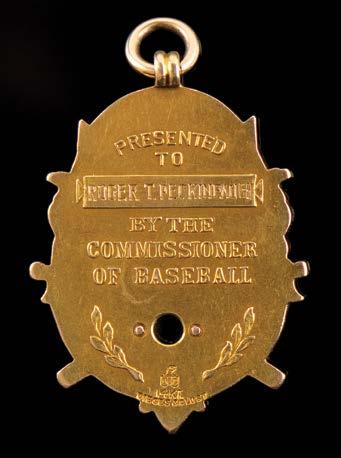
Roger Peckinpaugh’s 1924 Washington Senators World Series Championship watch fob pendant, crafted from 14K gold by Dieges & Clust, engraved on the reverse: “Presented to Roger T. Peckinpaugh by the Commissioner of Baseball,” and marked “14KT / Dieges & Clust.” The front features a patriotic depiction of the US Capitol flanked by bald eagles, over crossed bats and a silver baseball inset with a round cubic zirconia; above, the team’s city, “Washington,” appears in gilt text over red enamel, and below, “World 1924 Champions,” appears in gilt over blue enamel. The pendant is surmounted by a standard golden loop. The piece measures approximately 1.25˝ x 2˝, and weighs 23.9 grams. In fine to very fine condition. This watch fob is equivalent to a modern World Series ring—prior to rings becoming standard fare in 1926, players and coaches were commonly awarded pendants and watch fobs as championship ware.
The 1924 World Series saw the Washington Senators square off against the New York Giants in an enthralling seven-game sequence. Considered one of baseball’s most exciting championship rounds of all time, the story of the Series is one of redemption. The aging hurler Walter Johnson was Washington’s ace, making his first World Series appearance after a legendary career. It was Peckinpaugh’s second time around, having lost the championship as part of the 1921 Yankees squad in a Series that saw him make a critical error in the deciding game.
Johnson lost a hard-fought battle in Game 1, pitching 12 innings in a heartbreaking loss; Peckinpaugh contributed two hits and an RBI, but it was not enough to overcome the Giants in extra innings. Washington fought back early in Game 2, scoring twice in the first inning. The Giants tied it up in the ninth frame, and the game looked like it was headed for extra innings again. With one out and a man on base in the bottom of the ninth, Peckinpaugh—who had struggled with leg injuries all season—limped to the plate and heroically hit a double, driving in the game-winning run to tie up the series at 1-1. His injury forced him to miss most of Game 3, and all of Games 4 and 5.
After splitting Games 3 and 4, Washington looked forward to another start from the ‘Big Train’ in Game 5. Despite pitching another complete game, Johnson surrendered 13 hits and recorded his second loss of the series. The New York Times called Johnson’s performance ‘one of the saddest stories ever known to baseball.’ It was clear that the team sorely missed Peckinpaugh’s steady infield defense, and he vowed to play again as the club faced elimination in Game 6: ‘I’ll be in there if I have to tear the leg off and throw it away when the game is over…I’ll play if I have to stand on one foot.’
Peckinpaugh took the field for Game 6 with his leg heavily bandaged, and went 2-for-2 with a walk and run scored. He made a brilliant play in the ninth inning to protect Washington’s one-run lead, ranging to his left to make a force out at second base as his leg gave out from under him. His teammates had to carry their collapsed shortstop off the field. Player-manager Bucky Harris reported: ‘He didn’t break his leg, but he turned a tendon, opened up an old charley horse and must have suffered the agonies of the damned. If that isn’t gameness, there’s no such thing in athletics.’
His own World Series over, Peckinpaugh had to watch the Game 7 thriller from the Washington dugout. Down 3-1 in the bottom of the eighth inning, Bucky Harris hit a two-run single to tie it up. Reaching into the bullpen for his best pitcher, he then called upon the twice-beaten Walter Johnson to open up the ninth. The ‘Big Train’ stepped up with four scoreless innings, returning to his legendary form. In the bottom of the 12th, a bad hop on an Earl McNeely ground ball allowed Muddy Ruel to score the winning run for Washington. It was Washington’s first-ever World Series victory, a feat that would not be repeated for 95 years.
Provenance: The Roger Peckinpaugh Family. Starting Bid $1000
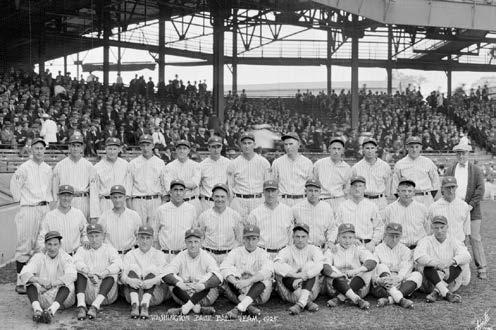
Cobb, Foxx, and Speaker headline a rare team-signed 1928 Philadelphia Athletics baseball
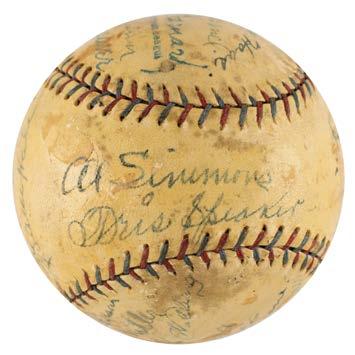

signed in ink on the sweet spot and side panels by 20 members of the 1928 Philadelphia Athletics team, including: Ty Cobb, Jimmie Foxx, Tris Speaker (ss), Al Simmons (ss), Mickey Cochrane, Lefty Grove, Jimmie Dykes, Joe Boley, Joe Bush, Sam Hale, George ‘Mule’ Haas, Ed Rommel, Jack Quinn, Joe Hauser, Carroll ‘Lefty’ Yerkes, William ‘Kid’ Gleason, Bing Miller, Rube Walberg, Ossie Orwoll, George Earnshaw. In very good condition, with soiling, toning from a light coat of shellac, and staining or scuffing affecting most of the signatures; the manufacturer’s stampings are strong, including the facsimile signature of AL President E. S. Barnard on a side panel.
Led by a slew of Hall of Famers—Cobb, Foxx, Speaker, Simmons, Cochrane, and Grove would all be enshrined in Cooperstown—the 1928 Philadelphia A’s finished with a 98-55 record, second only to the similarly stacked New York Yankees squad. It was the last big league season for both Cobb and Speaker, the first of Cochrane’s two AL MVP campaigns, and Grove’s first year as the league’s winningest pitcher. The presence of the tough signature of coach Kid Gleason—famed as the manager of the scandalous 1919 ‘Black Sox’—is also of note.
Provenance: The Roger Peckinpaugh Family. Starting Bid $200
Gehrig and DiMaggio star on this baseball signed by the 1938 World Champion New York Yankees
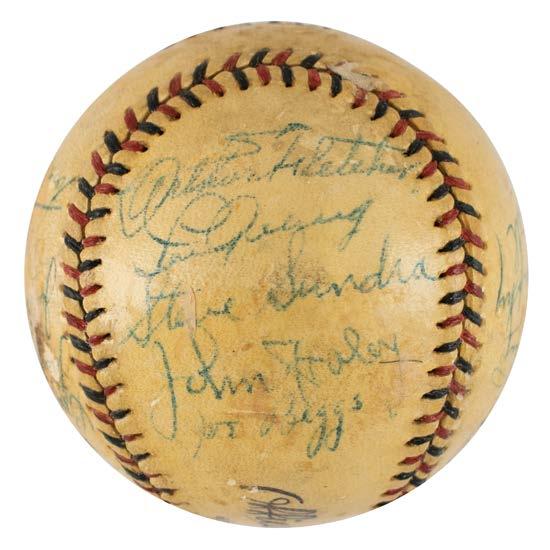
9006. 1938 NY Yankees Team-Signed Baseball. Goldsmith ‘Official 97 League’ Southern Association baseball signed in ink on the sweet spot and side panels by 16 members of the 1938 New York Yankees team, including: Lou Gehrig, Joe DiMaggio, Joe McCarthy (ss), Bill Dickey, Joe Gordon, Charles ‘Red’ Ruffing, Tom Henrich, Art Fletcher, Steve Sundra, Joe Beggs, John Haley, Johnny Murphy, Wes Ferrell, Bump Haldey, Frank Crosetti, and Jake Powell. In very good condition, with soiling, toning from a light coat of shellac, and scuffing affecting several names (slightly touching the downstroke of the “J” in DiMaggio’s signature, and not at all affecting Gehrig’s signature); the manufacturer’s stampings are strong, including the facsimile signature of Southern Association President Trammell Scott on a side panel.
The 1938 Yankees season represented a passing of the torch—it was the veteran Lou Gehrig’s last full season, and the young superstar Joe DiMaggio’s third year as a big leaguer. Their careers overlapped for just four seasons, and to have two of New York’s all-time greats on a single baseball is incredibly desirable. The Bronx Bombers swept the Cubs in the 1938 World Series—their third consecutive championship victory—cementing their place as one of baseball’s great dynasties.
Provenance: The Roger Peckinpaugh Family. Starting Bid $200
Team-signed baseball with Walter Johnson on the sweet spot, from the year of his last World Series appearance
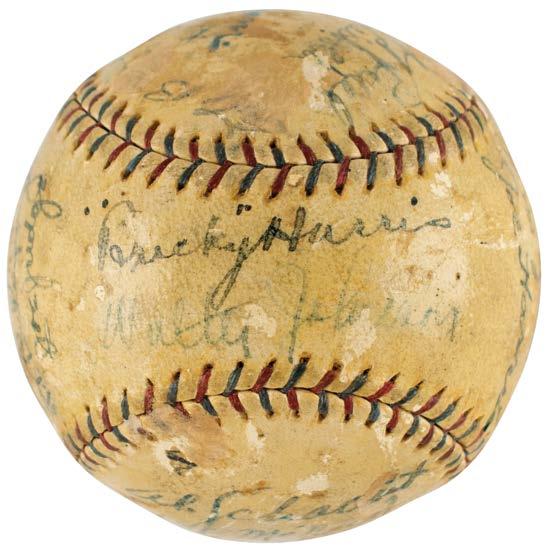
signed in ink on the sweet spot and side panels by 17 members of the 1925 pennant-winning Washington Senators team, including: Walter Johnson (ss), Bucky Harris (ss), Sam Rice, Stan Coveleski, Roger Peckinpaugh, Joe Judge, Allen Russell, Tex Jeanes, Tom Zachary, Joe Harris, Al Schacht, Earl McNeely, Spencer Adams, Alex Ferguson, Muddy Ruel, Harry Leibold, and Everett Scott. Also bears a clubhouse signature of Dutch Ruether. In very good condition, with soiling, toning from a light coat of shellac, and scuffing affecting most of the signatures; the manufacturer’s stampings are generally strong with a few scuffs, including the facsimile signature of AL President Ban Johnson on a side panel.
Coming off a heroic win in the 1924 World Series, the Washington Senators looked to repeat in 1925. They again won the American League pennant, but faltered in the World Series against the Pittsburgh Pirates. Peckinpaugh, the typically steadyhanded shortstop, committed a record-breaking eight errors; Johnson dominated in Games 1 and 4, but lost the deciding Game 7 match-up. Ban Johnson accused player-manager Bucky Harris of failing to relieve Walter Johnson ‘for sentimental reasons.’ Despite the second-guessing, Harris always said, ‘If I had it to do over again, I’d still pitch Johnson.’
Provenance: The Roger Peckinpaugh Family. Starting Bid $200
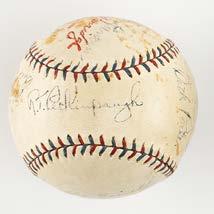
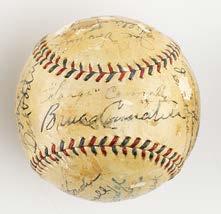
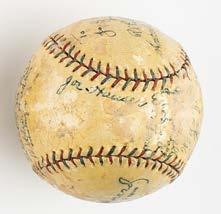
9008. 1929–1932 Cleveland Indians (3) Team-Signed Baseballs. Three baseballs signed by the 1929–1932 Cleve-
land Indians teams:
Official Reach American League (Barnard) baseball signed in ink on the sweet spot and side panels by 16 members of the 1929 team, including: Earl Averill, Joe Sewell, Roger Peckingpaugh (ins), Howie Shanks, Ken Holloway, Jake Miller, Willis Hudlin, Johnny Miljus, Joe Hauser (ss), Charlie Jamieson, Jackie Tavener, Lew Fonseca, Wes Ferrell, and others.
Official Reach American League (Harridge) baseball signed in ink on the sweet spot and side panels by 12 members of the 1932 team, including: Earl Averill, Mel Harder, Luke Sewell, Willie Kamm, Joe Vosmik, Dick Porter, Roger Peckinpaugh (ss), Glenn Myatt, Bill Cissell, Wes Ferrell, Ed Morgan, and Johnny Burnett.
Official Reach American League (Harridge) baseball signed in ink on the sweet spot and side panels by 20 members of the 1932 team, including: Earl Averill, Roger Peckinpaugh, Joe Vosmik, Luke Sewell, Willie Kamm, Sarge Connally (ss), Bruce Connatser (ss), Charlie Jamieson, Wes Ferrell, Ed Morgan, Dick Porter, Oral Hildebrand, Johnny Burnett, Clint Brown, Mel Harder, Bill Cissell, Ed Montague, Frankie Pytlak, Jack Russell, and Glenn Myatt.
In overall very good condition, with soiling, toning from a light coat of shellac, and staining or scuffing affecting most of the signatures of two balls; the brighter ball is not shellacked, but has staining touching about half of the signatures; the manufacturer’s stampings are generally strong, including the facsimile signatures of AL Presidents E. S. Barnard and William Harridge on the side panels.
Provenance: The Roger Peckinpaugh Family. Starting Bid $200


